Story and photographs by Emmjay
Just above the hot plate the lid and handles of the kettle start doing their impression of a samurai warriors’ headdress. The smoke from the fire changes its mind and swings away to the East. The wood is damp and rotten, but it dries easily and burns peat-like.
Tiny insects rush about as their world goes up in smoke.
Big Lars’ Point. Forty minutes’ walk along the edge of the mangroves to the clearing not far from the base of the waterfall. The sound of a lazy trickle running off the cliff out the back. Idle birdsong. The bush is busy relaxing, but it takes a careful eye to see this business. The possums are elusive this trip. And the kookaburras are reluctant to take their free lunch from the bird feeder. The whip birds and the lyre birds discuss with each other the agenda for the day.
The leech is an elastic band with a yellow racing stripe, silently hooping its way across the wet grass, over the battered ding boot and up the inside of the leg of a pair of Levis stiffened by sweat, dirt and grease. It takes several sweeps of consciousness to feel the damp trickle and to roll the fabric up until he’s spotted. Barely started his day job.
I flick the leech off. This is not the correct way. He hands me the salt. I stomp the leech into the soft earth. That won’t kill him! And he’ll just come back for another go. But the leech is deep within a heel mark and under a blanket of opprobrium. Surely it’s curtains for him.
He knows the bush. This is his patch and he’s usually right. I cast the occasional glance towards the leech hole, sure enough. There it is, looping the loop up a grass stalk to take a sniff around. I salt the leech. He goes into a dance of exquisite torture. Shrinks to a thin strip of leather and lies motionless.
The kettle starts to raise some steam. Takes its time and offers up the chance to slow down and appreciate the peace and savour the tea when it arrives. I uncross and recross my legs and toast the left leg a little, watching the steam rise from my boots.
Big Lars’ Point has a curious effect on time. Sleep comes easily. There is no hurry. Breakfast starts with a sweet coffee. Play with the fire. Eggs and bacon, grilled tomato and mushies on rough bread toast. Another coffee, maybe time to play with the brush cutter and thrash a few metres of path through the palm grove.
Just time for lunch. Half past one and the sun moves behind the cliff top. Cool and damp setting in. It’s three o’clock and time for a dram and to stoke the fire again. A few beers and it’s time to think about dinner.
Barbecue, dancing in the firelight and ducking and weaving with the torch.
Big Lars’ Point has no electricity. The water is drawn from the creek for washing and heated in the kettles. We carry in drinking water because nobody trusts the creek any more beyond washing and watering the plants. The shower is an army khaki canvas bag hanging from a pulley off the veranda. Cold. But the kettles on the fire warm the shower water up. Candles. Kerosene heater. How blue is the kero ? Gas and batteries. Heat and light when the fire has its night.
The house has trod the fine line between growth and decay for almost thirty years. It’s hard to know which is winning. There is no road in and it’s a long way up the river and a long walk from the jetty along the edge of the mangroves and through the rain forest to the house.
Thirty or forty years ago, Big Lars tried to land an old ford truck near the point – to carry building material and fire wood, but the truck slipped off the barge and sank up to its doors in the black mud. The mangroves and salt water have been eating the old truck slowly but they are almost done now.
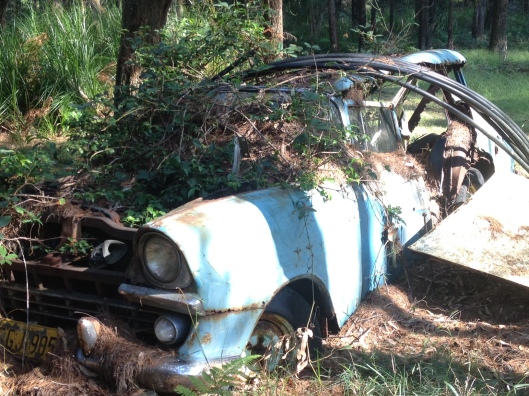 At the edge of the clearing slumbers the other failed attempt at automotive transport. The powder blue Holden station wagon landed successfully. She only ran once or so the story goes. In the night, the rats ate her radiator hoses, and when Big Lars returned next trip with replacements, they had stripped her wiring.
At the edge of the clearing slumbers the other failed attempt at automotive transport. The powder blue Holden station wagon landed successfully. She only ran once or so the story goes. In the night, the rats ate her radiator hoses, and when Big Lars returned next trip with replacements, they had stripped her wiring.
It’s said that that was the last straw. Big Lars gave up and sold his spread to a Kiwi carpenter who completed most of the house and when his bride fell pregnant and (wisely, I reckon) refused to try to give birth and raise a bairn there, they sold it to the old bloke who owns it now.
Big Lars was a Swede. A giant habitué of the river. A surveyor, it was said, who saved a few of the better plots for himself.
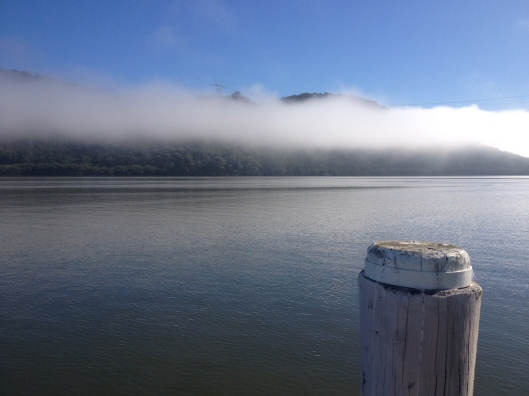 This is his silence. The bird calls and the crash of the dead branches are his. The black mangrove mud is Big Lars’ and also the shallowness of draft of any boat wanting to land her passengers on the point.
This is his silence. The bird calls and the crash of the dead branches are his. The black mangrove mud is Big Lars’ and also the shallowness of draft of any boat wanting to land her passengers on the point.
It’s a struggle, etched in raw timber, grime, spider webs and candle wax, fought over thirty years. And as the sinewy old bloke feels the cold and damp in his bones, he wonders how long he can keep the clearing wide enough to give him a decent margin before the snakes and ticks and leeches territory begins.
The forest would claim the clearing, given half a chance and it sends out scouting parties of ferns and reeds – and native grasses where the sun breaks through the canopy in the middle of the day.
The mowing’s done. By the fire, I pull up an old easy chair. It migrated in on some long forgotten high tide and stuck itself in the mangroves. I pick the corkscrew grass seeds out of my socks and slowly sip a cold beer from the kero fridge.
It’s five in the afternoon. The light is failing and it’s time to create order, signifying the end of the day and preparation for the night. The evening mist rolls in off the river and the darkness inside the house seems not so dark. The kero heater beckons and the first drops of rain shush over the tin roof.
* not his real name

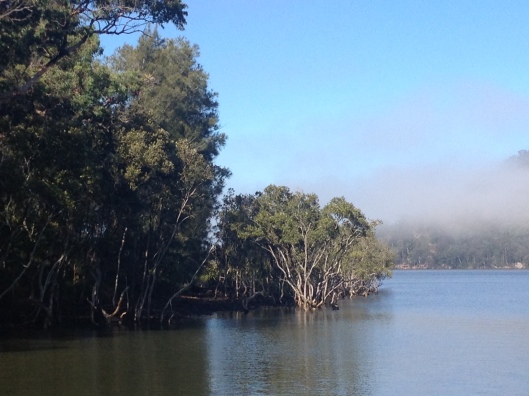
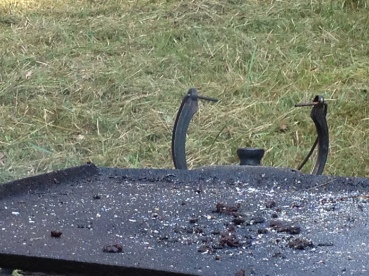
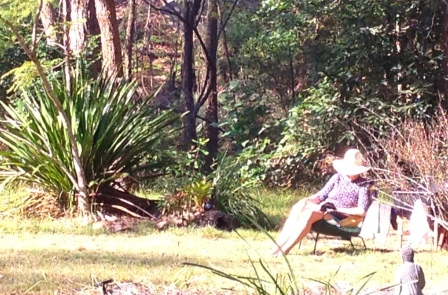
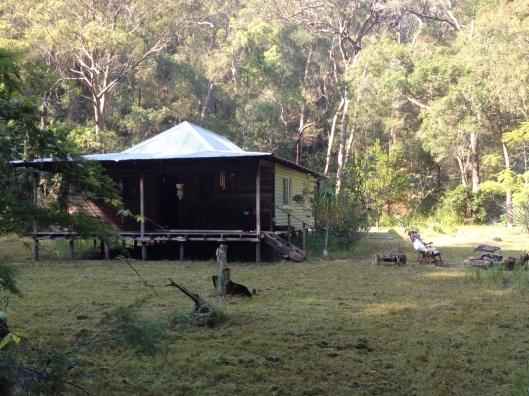
Good to be away from all the comforts and luxuries even just for weekend, it makes us appreciate everything we have, might even stop us complaining… 🙂
I love the beautiful photos, who is responsible for those?
LikeLike
I cannot tell a lie, H. C’est moi !
LikeLike
Nice story there Emm, much resonance here having grown up at Hornsby and the Hawkesbury was somewhat of a backyard. That and the bushwalking. Sounds relaxing.
LikeLike
Bit of a departure the style ie to my knowledge as far as I have seen in recent time, Emm. Poetic and reflective you had changed your place around. I like that it is very in rhythm with the lapping of the water at that, o so hopeless in many ways for Lars, place.
LikeLike
Thanks, ‘Shoe. It had a bit of a Picnic at Hanging Rock fell about the place. Had not the grog run out, there’s a remote chance we might still be there 🙂
LikeLike
You must have had an inspiring week-end, Emm. Lovely writing, good word order. I can feel the leeches. Years ago our family went to Bar’s Point on the Hawkesbury. We towed our 12 ft Brooker and boated towards this idylic spot, walked around and went back again. There were already many houses.
Your Lars spot seems to be still untouched and your pictures are enticing too. Did you do any fishing?
LikeLike
Thanks, Gez. No fishing. I regard it as being as dull as golf, but more disgusting in the unlikely event that I might catch something. 🙂
LikeLike
emmjay when I grow up will I be able to write like you ????
And it reminds of another wild and beautiful place I used to know in Victoria.
LikeLike
Thank you lindyp. You’re very kind. Perhaps you might like to frame a few words a Haiku, perhaps about your Victorian place.
LikeLike
Sounds like heaven to me right now. Heaven with leeches… the way you paint the picture I feel like I’ve been there.
LikeLike
I had the same feeling, then i remembered Emmjay telling me of such a place…or perhaps it was Foodge.
Nicely written.
LikeLike
Thanks, Nev and Big. I enjoyed being there, but the hot shower and soft bed when we arrived home were truly welcome !
LikeLike
Beautiful place, beautiful nature Emmjay.
I don’t mind sharing my blood, but not with leeches, vampires and Gina Rineharts. 🙂
LikeLike